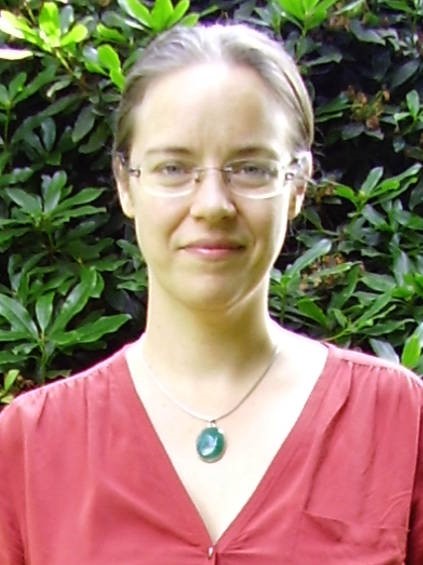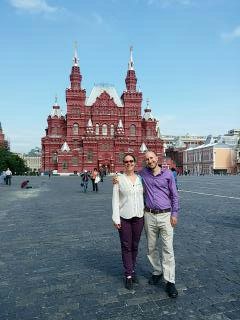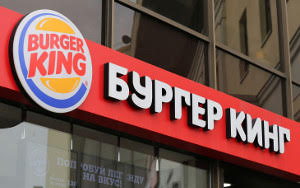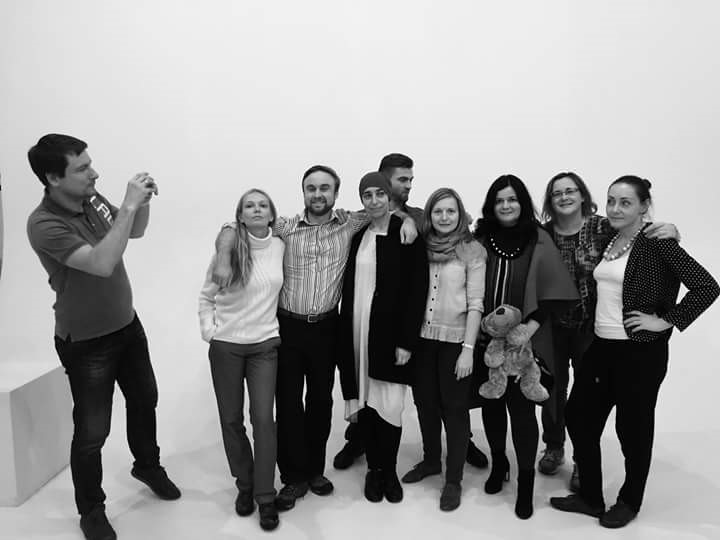Anouk Brack, MSc.

In 2015 I traveled to Moscow twice to teach about Leadership Embodiment in the Embodiment Facilitator Course (EFC) by Mark Walsh and Alexandra Vilvovskaya. I was asked to reflect on my experience teaching in Russia for this special edition of Integral Leadership Review.
Context: the Embodiment Facilitator Course
This course is aimed at body workers who want to offer their services in business and organisations, and for HR professionals and (executive) coaches who are looking to include the body more in their work. The course is held in an integral framework, teaching about quadrants, levels, lines, states and types, but all related to becoming more embodied and teaching about embodiment. Unique about this approach is firstly the inclusion of the body as a powerful resource for more effective and more socially responsible leading and conducting business. Secondly, and more unique, is the inclusion of how to teach embodiment in an effective and ethical way by looking at the patterns (credits for figuring this out go to Mark Walsh who I jokingly call “the Ken Wilber of embodiment”) and didactics of including an embodied approach in any coaching, training or therapy. My role in the course is to present Leadership Embodiment, a specific method I was trained in by the founder Wendy Palmer.
Theme: Living and working with extremes
The theme I choose for my reflections about this experience in Moscow is “working
within extremes”.
Temperature range form -40 to +40 degrees Celsius

Illustration 2: Anouk Brack and Nir Esterman at the Red Square in May 2015
The temperature for one thing: it is perfectly normal to “enjoy” +40 degrees Celsius in the summer and -40 degrees Celsius in the winter. I am so glad to have been there in the spring and autumn with temperatures between -2 and 20 degrees. That’s more what my Dutch body is used to!
Participants range from multinational HR-professionals to hippie dance-therapists
The participants of this course range from hippie-like body psychotherapists, to equal rights activists, to senior HR executives of big multinationals, to executive coaches. An interesting mix. Russia and especially Moscow has a wide range of vmemes; certainly a lot of blue still (and I am sure some repressed red), but a fast growing orange (multinationals) and green (equal rights for women), and quite a few exploring integral levels (like the organisers of the EFC course, and Eugene Pustoshkin, the editor of this special issue to name a few). With the society centre of gravity still in blue, I would guess. But seriously, who am I?! How can I figure the Russians out in two three-day visits? Their country’s psychological make up is all about projecting mystery! 🙂
Cultural Embodiment: power and mystery
How this living with extremes and projecting mystery shows up in the embodiment of the Russians can be seen in a couple of things. I will highlight facial expressions and posture. For a more extensive (but still generalizing of course) video on the topic, watch Mark Walsh:
Facial expressions – Russians don’t smile?
For instance facial expressions can be very subtle to some of us more expressive peoples (like me and the Americans). I was told before I went to Moscow that Russians don’t smile. I found this untrue. They do. However much less and much less obsessively than the rest of us.
When Alexandra was demonstrating the difference between sad, mad, glad and afraid, I hardly saw anything change in her face. It was more that I felt a slight shift in the atmosphere. I felt the mood shift slightly. I guessed right most of the time, but this was with my full attention and someone I have known for a few years now.
Posture: strong and stiff; with some sexy and some trauma
Posture is quite gendered. For men a strong and stiff posture is normal. For women a modest and very feminine even slightly sexualized (in pictures and selfies) posture and expression is normal. All of this compared to my western standards obviously. So please excuse the rough brush strokes here, I am just trying to paint a picture of the general differences. The younger generation (early twenties) are much looser and more expressive. This can be explained by them not personally having lived through some of the hard times with a more aggressive fear based regime. The collective Russian body still holds a lot of trauma underneath its strong and mysterious outer shell. So any body-worker should tread extra carefully and be prepared to deal with what might come to the surface. Older women can display what I call the Italian woman syndrome: petite and seductive before marriage and obese and dominant shortly after.
Strong fear-based leadership is only option
In a country so vast as Russia with no examples of benevolent strong rulers in their history (only in literature) a strong leader is the only option. That is why Putin is as popular as ever. He provides clarity, some safety. “Any change could be a change for the worse. So better stay with what we know that is not as bad a before. Too much freedom and democracy creates a lot of fear and uncertainty. Better not go there.”
The cultural values and beliefs still (note this word) hold strong patriarchal values. Note: I keep catching myself writing “still” as in pretending to know where Russian development will lead. Because of my knowledge of Spiral Dynamics and Integral Theory now I have the arrogance to know the next steps of the strong and mysterious Russians?? Nope, good luck figuring the Russians out. I need to be humble. Maybe this is where it will go, but the Russian expression of those levels will go entirely guided by the Russian soul, something so deep and mysterious, no Westerner can truly grasp.
Personal leadership? What’s the use?
Where do you want to be in 5 or 10 years personally and professionally? This question, which is perfectly legitimate in Western Europe and USA, evokes a blank stare and then a look of disdain from a developed and established female Russian entrepreneur. The answer: “Why make dreams and goals if they will be crushed again?” She goes on to explain she does have a sense of direction in her life and business, she just thinks it is silly and unwise (and it might lead to disappointment) to create rigid goals. Personally I rather like this approach.
Allow me to go into a slight personal rant about leadership and power and love: What disappointed me was to find out by word of the first Russian facilitator of the Samurai game (http://samuraigame.org/) that Russians don’t have any examples of strong benevolent compassionate leaders in their history. This saddens me. Fortunately the Russians have a strong literary tradition and some of the inspiration that is missing in real life might be found there? I wonder what having no “good, ethical and warm” leadership examples in your collective consciousness does for your sense of possibility of personal growth and expression? When given the choice to be a strong and fear instilling human being, or keep myself small, it is a rather easy choice. What if there is another way of personal leadership that is fully awake, centered, strong and connected? What if we can all be more compassionately and wise humans together. What if that was a form of leadership too? I wish this for myself, and for Russians. But I have no clue if it even appeals to them in the slightest way. It certainly evokes my passion! But back to current state of affairs between Russian men and women…
Gender relations: beauty, ambition and a good husband
Middle-aged business man to woman in her early thirties: “Yes, yes, ambition for a woman is nice, but you have a nice face, surely a good husband is more important…” This kind of remark can silently enrage emancipated women, but they usually just sigh. There is a historical collective belief (that might be outdated by the facts) that there are not enough good men (killed in war), so it is extra important for Russian women to look nice and be a good woman. And they also want to pursue their ambitions. Interesting and challenging paradoxes to navigate.
A beautiful example of conflicting value systems in Russian society was this middle aged business man in the course reflecting on a leading and following exercise exploring his personal patterns: “When I was led by a woman, I didn’t believe she knows what she is doing. When led by a man, I had no trouble. When I led a man, I felt uninterested in his experience. When I was leading a woman a wanted to show her beautiful sights and was concerned about her opinion.”
Most people, including myself, held their face in neutral while he was sharing his experience. Some of the women engaged in the women and gay equal rights movements couldn’t hide their response (but wanted to). Nobody confronted him directly. I thanked him for sharing and remarked that it is good to realize you hold these beliefs and that perhaps they are no longer of service to him in a changing society. That he might miss some interesting possibilities because of them.
I have never come across someone so unapologetically phrasing these beliefs, that in western terms would be called sexist. Maybe some of my Dutch participants still hold those beliefs, but they know it is no longer culturally acceptable to think that way. The comment today was refreshing in that sense. But disturbing in another way. When the legal fights have been fought, the inner work of getting used to this new way of being still takes some decades to really ingrain in us.
Living with extremes created tough and caring people
 I was afraid to go to Moscow at first: a scary leader, an illegible alphabet (Cyrillic), having a translator during the training, non-smiling people, and having to fly over there (not a fan of flying). All of that didn’t sound too appealing. But the few people I had already met were lovely and deep and trustworthy and committed. I asked my intuition and it told me to go, I listened. The areas in Moscow that I visited and the underground metro system all resembles London to me, just with illegible signs. I have felt very well taken care of and the people seem friendly, hospitable and strong. Good to know the first “no” doesn’t always end up meaning no. Holding your ground, friendliness (or next: anger) can help get things done. Sounds human… 🙂
I was afraid to go to Moscow at first: a scary leader, an illegible alphabet (Cyrillic), having a translator during the training, non-smiling people, and having to fly over there (not a fan of flying). All of that didn’t sound too appealing. But the few people I had already met were lovely and deep and trustworthy and committed. I asked my intuition and it told me to go, I listened. The areas in Moscow that I visited and the underground metro system all resembles London to me, just with illegible signs. I have felt very well taken care of and the people seem friendly, hospitable and strong. Good to know the first “no” doesn’t always end up meaning no. Holding your ground, friendliness (or next: anger) can help get things done. Sounds human… 🙂
So, good luck trying to figure the Russians out…
One thing’s for sure though, I look forward to all the good and beautiful that can come out of humanity side by side leading ourselves to larger circles of wisdom and compassion. Done by ordinary men and women, and by the feminine and masculine principles present in each of us. Together we might contribute to a dynamic balance towards greater wisdom and compassion. I hope.
About the Author
Anouk Brack holds an MSc in biology, specialisation neuro-physiology. She is an expert in embodying integral leadership for sustainability. She is an executive coach and international Leadership Embodiment trainer at incompany.anouka.nl/ and at centreforembodiedwisdom.com. She founded the Experience Integral Foundation (experienceintegral.org) for sustainable leadership in 2009. She has been teaching master-level skill courses like “Integral Leadership for Sustainability”, “Intuitive Intelligence”, and “Facilitating Innovative Learning Processes” at Wageningen University (WUR) in the Netherlands since 2000. She welcomes connection at www.linkedin.com/in/anoukbrack.
Previously by Anouk Brack in ILR: Her article on “3 Dimensional Leadership Development” describes the three dimensions of leadership development (Skill, Stage and State) and how Leadership Embodiment as a state practice fits into, and can be vital for, any Leadership Development program. http://integralleadershipreview.com/11274-331-insights-3-d-leadership-development-enactment/

